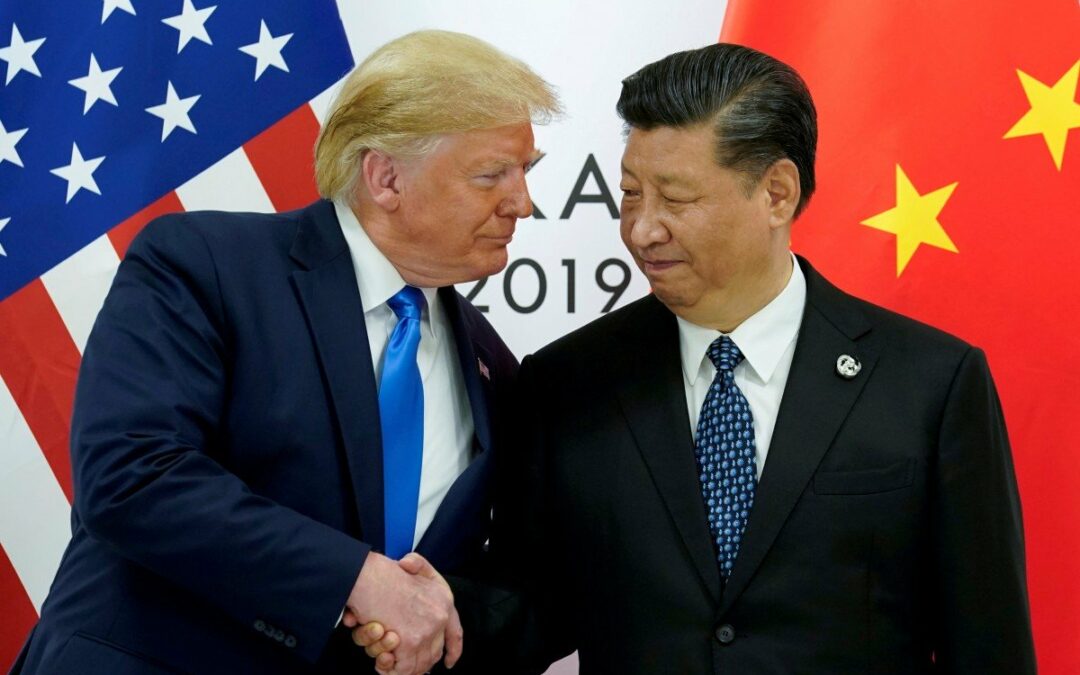President Trump suggested toay that he might veto legislation designed to support pro-democracy protesters in Hong Kong — despite its near-unanimous support in the House and Senate — to pave the way for a trade deal with China.
Speaking on the “Fox & Friends” morning program, Trump said that he was balancing competing priorities in the U.S.-China relationship.
“We have to stand with Hong Kong, but I’m also standing with President Xi [Jinping],” Trump said. “He’s a friend of mine. He’s an incredible guy…But I’d like to see them work it out. Okay. We have to see and work it out. But I stand with Hong Kong. I stand with freedom. I stand with all of the things that we want to do, but we also are in the process of making the largest trade deal in history. And if we could do that, that would be great.”
The House on Wednesday passed the Hong Kong Human Rights and Democracy Act by a vote of 417 to 1.
The lone holdout was Rep. Thomas Massie (R-Ky.).
That came one day after the Senate had approved the measure on a unanimous vote.
The veto-proof majorities indicate that Congress could overrule the president if he tries to block the bill from becoming law.
“If he does veto this bill, sacrificing American values in the process, Congress should immediately and overwhelmingly override,” tweeted Scott Paul, the president of the Alliance for American Manufacturing, who has often backed Trump’s trade policies.
China says Trump is on ‘edge of precipice’ as Hong Kong rights bill hits his desk
Once a bill is passed by both chambers of Congress, the president has 10 days to sign it into law or veto it.
If he does neither, it will become law automatically. That means Trump has until after Thanksgiving to make a decision.
The legislation authorizes sanctions on Chinese and Hong Kong officials involved in human rights abuses and requires the State Department to conduct an annual review of the special autonomous status that the U.S. grants Hong Kong in trade matters.
The Hong Kong bill threatens to complicate trade negotiations that already are stalled on several key issues.
Chinese officials have criticized the congressional action as unwanted interference in their country’s internal affairs.
Vice President Pence said this week it would be “very hard” to finalize a trade deal if China resorts to violence to put down the protests, now in their sixth month.
China regained sovereignty over Hong Kong in 1997, ending more than 150 years of British colonial rule.
Maintaining control over the prosperous enclave, which Beijing governs under “the one-country, two-systems framework,” is a top priority for Xi.
Chinese officials would likely react sharply if the U.S. legislation becomes law. But that reaction wouldn’t necessarily imperil the trade talks, according to Jeff Moon, a former U.S. trade negotiator in the Obama administration.
In the past, China has reacted to perceived slights by denying permission for U.S. Navy vessels to make port visits to Hong Kong, he noted.
“Trump’s task is to de-link Hong Kong from trade, and to help Xi find a way to express displeasure over U.S. legislation without taking precipitous action that will create indefinite deadlock in the trade war,” Moon said. “The irony here is that Trump’s comments on Fox signal uncertain resolve and negotiating weakness in the trade war while talks are faltering and he needs to show determination to press China on the whole range of issues, not just agricultural products and tariffs.”
Trump last month announced an “agreement in principle” with China on a partial trade deal, which he hoped to sign by mid-November.
But talks have deadlocked over the details of Chinese purchases of U.S. farm products and plans for the removal of Trump’s tariffs on $360 billion in Chinese goods.
Trump’s public comments about Hong Kong have been inconsistent.
In June, he said a resolution of the protests was between Hong Kong and China “because Hong Kong is part of China.”
Two months later, he tweeted that Xi should “humanely” deal with the situation before a trade deal was inked.
“Of course China wants to make a deal. Let them work humanely with Hong Kong first!” the president wrote.
Trump has faced calls from lawmakers in both parties to speak out about what’s at stake in Hong Kong’s escalating demonstrations.
“The world should hear from him directly that the United States stands with these brave men and women,” Senate Majority Leader Mitch McConnell said this week.
Trump also claimed, without evidence, that he had saved the lives of thousands of Hong Kong demonstrators by telling Xi not to intervene.
“The only reason he’s not going in is because I’m saying it’s going to affect our trade deal,” Trump said.
